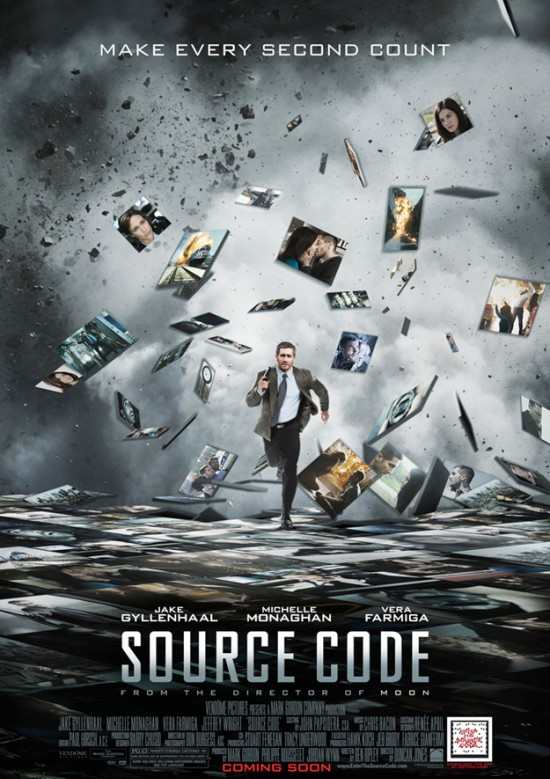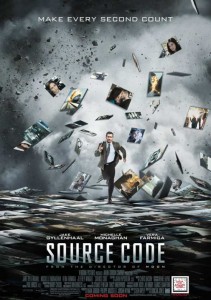Aisa Villanueva
Staff Writer
Blockbuster movies are aimed to entertain and captivate the fancy of the audience. They are our tickets towards the often exciting, vicarious life of love-induced endorphins or suspense-thriller driven adrenaline highs. Movie-makers know that their target market meanders into theaters in search for that movie that will allow them to detach themselves from their own dilemmas and predictable lifestyles.
Admittedly, I, too, was an eager entertainment seeker. I came into the theater full of anticipation for the adventure that Ben Ripley’s action-packed Source Code was about to lead me to. The moment I saw Colter Stevens (Jake Gyllenhaal) jerk up his head in confusion and disarray, I was hooked. I was continually guessing what would happen after each of his eight-minute moments of repeated limbos.
Dr. Rutleledge (Jeffrey Wright), the inventor and head-honcho of the government-run endeavor, “The Source Code,” painfully explains to memory-worn Stevens that he is in a computer program that allows a person to enter into a parallel universe and assume another person’s identity during the last eight minutes of his life. Stevens was the most compatible army man who could penetrate the Source Code and, in turn, be sent on a mission in search for the terrorist who was ready to set off bomb-explosions in Chicago.
Source Code could mightily be compared to the mind-boggling mazes and games that Inception revolved around. Similarly, because Stevens is given the rare chance to play with time, many have mentioned the strong similarity that the movie has with the romantic-comedy Ground Hog Day.
I believe that is the extent to which all the comparisons should end, because doing any more so would just insult Source Code’s obscure beauty. Although I came into the theatre with my eyes longing for entertainment, my mind came out satisfied because I got more than just a blockbuster movie. It was a story that latched onto me because I could actually hear the horrors and reality of today’s news in it. This is why, more than anything, what Source Code reminded me the most about was the movie X-Men.
Stevens’ puzzle pieces, if given a different leading man’s name, would be somewhat the same as the X-Men’s Wolverine (aka Logan). Both are men who, in the first scene, are frazzled, lost tabula rasas yearning to find the content that was meant to be written in them.
In Stevens’ case we find out, (just like Logan), that he was part of a military experiment set to further arm the American government with protection against its enemies. With God-like power, the Source Code gave the military the strength to stop terrorist attacks. The high-ranking military officials would, with a rather cowardly, dainty wave of a hand approve to send men out blindly to protect American freedom and democracy, regardless of the amount of training they have.
Although their presence was not leaked to the public, the very covert environment that the Source Code thrived on carries the same story as George Bush’s Abu Ghraib, the Blackwater shooting incidents in Iraq during 2007 and the highly-publicized military accounts posted on WikiLeaks. Is Ben Ripley sewing into the public’s subconscious his approval of such practices or is he back-handedly setting out a message that such underground activities gives its wielder too much power, to the point of damage?
In the end, Stevens finds out that he is dead. He functions with the help of machines. His brain is the only fully working organ left. Upset, he asks Dr. Rutleledge why he was preserved. The doctor says that many service men would prefer this over death. Stevens barks back asking if he had ever spent time in battle. Frustrated, the doctor says that such a question is immaterial.
“It’s not only about you…but about two million real world Americans.You’re a born hero, son. Saving people is what you do best,” he said.
In the movie’s last few minutes, the camera pans into where the real Stevens lies. Source Code’s “Wolverine” is inside a semi-frozen, protective pod with half of his body cut off and his spine sticking out. With eyes closed, he goes on mumbling because he is in the middle of his Source Code-stimulated mission. Half of his skull has been removed and wires that connect him to the program are glowing around him.
With Abu Ghraib and Blackwater’s many shady activities now out in the open, is Source Code meant to be just an alternate Hollywood reality, or should we expect it (and any of its deviants) to collide with our reality any time soon? If so, must frozen Colter Stevens-like heroes always be the ones to feed the appetite of the bald eagle’s democracy and absorb gun shots shield its freedom?













Comments are closed.